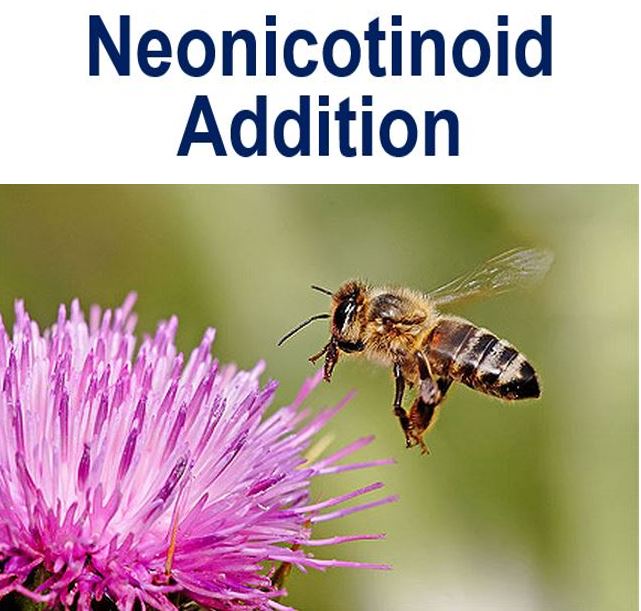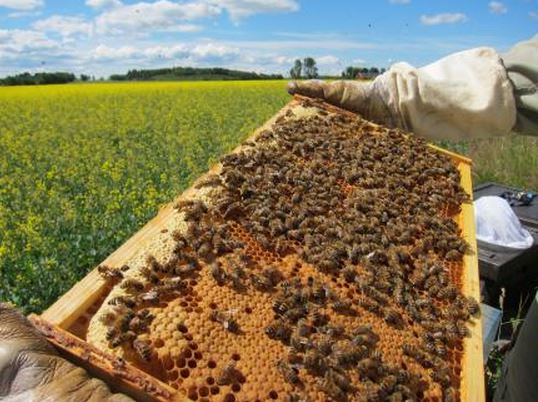Bees prefer pesticide-laced nectar, specifically neonicotinoid pesticides, which work on their brains in the same way nicotine does on humans, making them addicted, say scientists from Trinity College Dublin, Newcastle University and the University of Oxford.
When bees settle on a flower whose nectar has been treated with a neonicotinoid pesticide they stay longer and consume much more, compared to other flowers, the researchers reported in the journal Nature.
If they consume more, their body levels of pesticides will be higher, which can damage their health. Could neonicotinoid pesticides be one of the factors contributing to the serious decline in bee populations?

Bees can become addicted to neonicotinoid pesticides, which work on their brains in the same way nicotine does with humans.
Neonicotinoids like nicotine act on bees’ brain receptors, making them want more. The scientists believe their findings show that bees’ preference for nectar laced with neonicotinoid pesticides raises their exposure to dangerous levels of toxins.
Professor of Insect Neuroethology (the study of the role of the nervous system in animal behaviour) at Newcastle University Geraldine Wright, and colleagues discovered that buff-tailed bumblebees and honeybees are unable to avoid neonicotinoid pesticide-laced nectar because it has not taste.
Evident preference for food with neonicotinoids
The study found that bees have a clear preference for neonicotinoid-laced food. When presented with both neonicotinoid-laced and neonicotinoid-free food, the bees consumed significantly greater quantities of food containing neonicotinoid, the authors wrote.
While both types of bees appeared to prefer food containing neonicotinoids, the bumblebees seemed to be more addicted – they ate much more of it and spent longer eating it, the researchers commented.
This means that bumblebees are especially at risk of accumulating dangerous levels of pesticides.
Pollinating insects are crucial for farmers’ livelihood and food security. Studies estimate that pollinating insects contribute economically to the tune of $164 billion (€153bn, £109bn) towards global crop yields each year.
Bees can be exposed to dangerously high levels of pesticides in floral nectar and pollen. Several studies have demonstrated that pesticides undermine colony fitness and bee foraging.
Over the past few years, concern has increased regarding the detrimental effects that neonicotinoids might have on insect pollinators.
Neonicotinoid pesticides are used for seed dressing of rapeseed, to protect young plants from flea beetles. Since 2013, the European Union has restricted the use of this type of pesticide for crops that are attractive to bees.
Poisoning risk
Professor Wright said:
“Bees can’t taste neonicotinoids in their food and therefore do not avoid these pesticides. This is putting them at risk of poisoning when they eat contaminated nectar.”
“Even worse, we now have evidence that bees prefer to eat pesticide-contaminated food. Neonicotinoids target the same mechanisms in the bee brain that are affected by nicotine in the human brain.”
“The fact that bees show a preference for food containing neonicotinoids is concerning as it suggests that like nicotine, neonicotinoids may act like a drug to make foods containing these substances more rewarding.”
“If foraging bees prefer to collect nectar containing neonicotinoids, this could have a knock-on negative impact on whole colonies and on bee populations.”
Senior Lecturer at Trinity College Dublin, Professor Jane Stout, said:
“Our findings imply that even if alternative food sources are provided for bees in agricultural landscapes where neonicotinoid pesticides are used, the bees may prefer to forage on the neonicotinoid-contaminated crops.”
“Since neonicotinoids can also end up in wild plants growing adjacent to crops, they could be much more prevalent in bees’ diets than previously thought.”
Separate neonicotinoid pesticide field study
In another study, also published in Nature and performed at Lund University, Sweden, researchers found that a neonicotinoid pesticide – clothianidin – harmed wild bees in an agricultural landscape.
Lead researcher, Maj Rundlöf, who works at the University’s Faculty of Science, said their findings were worrying, because wild bees – both honeybees and several bee species – play a crucial role in crop pollination.

In the Swedish field study, bees were affected when the pesticide clothianidin was used. (Image: Lund University)
Dr. Rundlöf explained:
“We saw a clear negative impact on growth and ability to reproduce in bumblebee colonies near treated rapeseed fields.”
Apart from growth and reproduction problems, the researchers noted that there were also considerably fewer wild bees on the rapeseed field treated with the pesticide.
They did not find any negative effects on the colony growth of honeybees.
Dr. Rundlöf said:
“If we only investigate how a new pesticide affects honeybees, that is not sufficient to predict the consequences for wild bees in a real landscape.”
Project Manager at the Swedish Board of Agriculture, Thorsten Rahbek Pedersen, said:
“The results show that it is inappropriate to use clothianidin on rapeseed. We need alternative preparations and new cultivation methods if we are to continue growing spring rapeseed in Sweden.”
A European Commission-funded study announced in March that 9.2% of Europe’s wild bee species face extinction due to climate change and modern farming practices, which have considerably reduced the number of flowers over recent decades.
References:
“Bees prefer foods containing neonicotinoid pesticides,” Geraldine A. Wright, Erin Jo Tiedeken, Samantha Softley, Jane C. Stout, Sophie Derveau, Sébastien C. Kessler, Kerry L. Simcock and Jessica Mitchell. Nature. April 22nd, 2015. DOI: 10.1038/nature14414.
“Seed coating with a neonicotinoid insecticide negatively affects wild bees,” Ove Jonsson, Thorsten R. Pedersen, Riccardo Bommarco, Georg K. S. Andersson, Maj Rundlöf, Ingemar Fries, Veronica Hederström, Lina Herbertsson, Björn K. Klatt Johanna Yourstone & Henrik G. Smith. Nature. April 22nd, 2015. DOI: 10.1038/nature14420.
Video – Clothianidin harms wild bees
Maj Rundlöf talks about how clothianidin affects wild bees.

